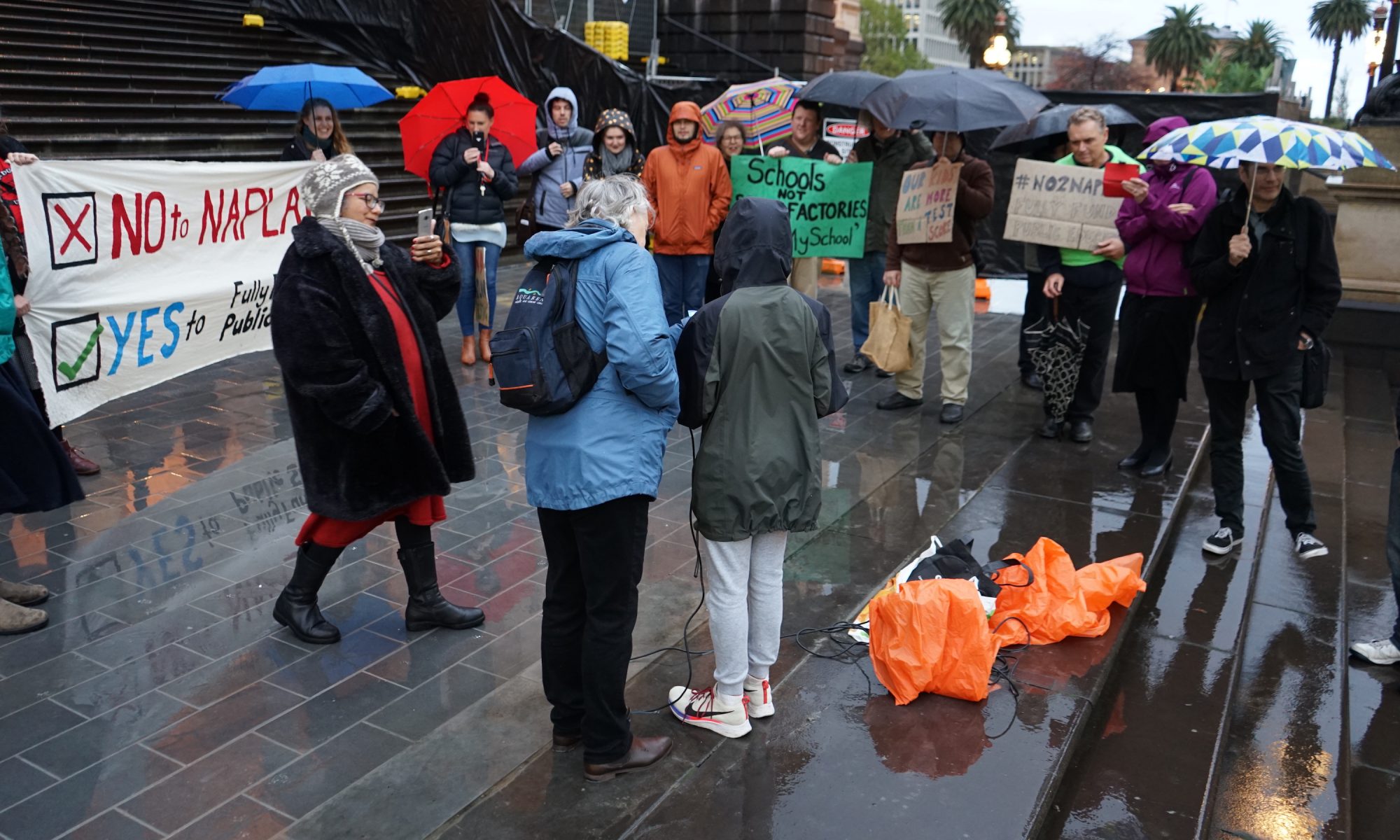As rank-and-file members of the Australian Education Union (AEU), we welcomed the Victorian Department of Education and Training announcements Tuesday the 7th of April regarding the shift to remote and flexible learning in schools in Term 2. There are many aspects of this policy that provide relief and reassurance. Yet, several issues still require urgent attention.
As AEU leadership continues to negotiate our working conditions with the Department, it is vital that sub-branches pass motions to affirm the conditions we require to continue our work.
These motions highlight many of the pressing needs of workers in both schools and early childhood education and care (ECEC) settings, but we encourage you to also look to the United Workers Union statement of demands for a more detailed look at current needs in ECEC.
We encourage education workers in other states to use this document to inform their own struggles for safe and reasonable working conditions.
SCHOOL-BASED LEARNING
This sub-branch endorses the position taken by the Victorian Government that:
- Students who can learn from home must learn from home
- School-based learning will continue for vulnerable children and the children of those who can’t work from home
- No school staff will be forced to work on-site, as the limited on-site staffing schools require will only include those who have volunteered for these roles
- Class sizes will be limited to a maximum of 10 students
- Hand sanitizer will be provided at entry points to classrooms
- COVID-19 testing will be available for school and ECEC staff where they have symptoms
Yet, we call on the Government to:
- Extend the first five measures to include ECEC settings, so early childhood workers, children and their families are equally protected.
We also ask for the following additional measures to be implemented in both schools and ECEC settings:
- Where a person’s job cannot reasonably be done remotely, they are given paid leave or alternate duties if these can be mutually agreed upon
- Sufficient hygiene supplies and facilities, including soap, hand sanitiser, toilet paper, tissues and sinks, are provided
- Frequently touched objects and surfaces are cleaned every two hours
- The number of children per class is appropriate to the age of children and their ability to practice physical distancing, with a maximum of 8 students per class from Grade 3 to 12, and 5 children per class from Prep to Grade 2 and in ECEC settings. The only time 10 students might be permissible is in rare cases when on-site classes are offered for VCE students in spaces where appropriate physical distancing is possible.
- Starting, finishing, meal and break times are staggered to enable physical distancing
- As practiced in Singapore, every child or student has their temperature checked in the school or ECEC foyer each day before being admitted. If their temperature is higher than 37.5 degrees, they return home and COVID-19 testing is made available to that student and all staff and students who have been in close contact with them. Any staff members conducting temperature checks are covered in appropriate personal protective equipment (PPE), at a minimum face mask and gloves.
- Additional PPE is provided to ECEC staff, due to the enormous difficulty maintaining hygiene and physical distancing with small children
- School and ECEC workers, and our trade unions, are respectfully and transparently included in decision making about closing schools, restricting attendance or returning to full on-site teaching and learning. For this to occur, we need the government to keep the public informed with the most up-to-date data and modelling being used to inform policy recommendations.
HOME-BASED LEARNING
Recognising that the transition to home-based learning is an enormous challenge for teachers, students and parents, this sub-branch calls on the Department to issue a more comprehensive policy that gives teachers the trust and flexibility to evolve teaching and learning practices that cater to the specific cohorts of students we teach, and allows us to focus on connection and care in this time of crisis.
We welcome aspects of your recently-issued policy, such as:
- Protecting teachers from an excessive workload by directing that teachers are only available for online communication during their hours of work
- Bridging the digital divide by providing a device and internet connection to any student who would otherwise be unable to access an online curriculum
However, we must learn from recent experiences interstate and overseas, where attempts to proceed with “schooling as usual” online have created enormous problems. These have included:
(i) reduced engagement of students
(ii) difficulty faced by parents having to split their attention between work and supporting their children’s education at home, including teachers who are also parents
(iii) excessive work hours for teachers, who are expected to be supporting students online all day, while also redesigning their curriculum for online delivery
(iv) frustration from both teachers and students when internet connections fail to keep up with the current usage
Therefore, this sub-branch calls on the Department to:
- Give teachers and education support staff the professional autonomy to determine how they work with students and their families to keep students meaningfully connected to learning
- Suspend the normal curriculum and cancel all standardised tests, including VCE exams. Commit to developing alternate paths to tertiary entrance.
- Suspend attendance and minimum work requirements for students during periods of online learning to reduce pressure on students, teachers and parents alike
- Place compassionate and realistic limits on what schools can ask of teachers and ES staff working from home, and provide paid leave or reduced hours and responsibilities for staff members struggling with caring and work responsibilities
JOB SECURITY
Casual workers, including cleaners, education support staff, relief teachers and administrative staff, are essential to the running of schools. There are currently inadequate provisions for their job security.
Thus, this sub-branch asks that the Department:
- Hires all casual school staff on a permanent full-time or part-time basis, so they are able to access the same leave and benefits available to departmental employees during this crisis and beyond
And asks the Federal Government to:
- Nationalise and fully fund all ECEC settings, employing all staff on a permanent full-time or part-time basis
- Bring any private schools facing bankruptcy and closure into the public education system
AFTER THE CRISIS
This year will be severely disruptive for all students. They will need intensive, targeted face-to-face support on their return to school. This will make the ongoing need to reduce class sizes and increase teacher preparation time even more urgent.
Therefore, this sub-branch asks that when schools fully reopen, the Department:
- Reduces class sizes to a maximum of 20 students
Reduces face-to-face teaching hours to 16 per week (to increase teacher planning time)
Link to GoogleDoc to download and adapt.

